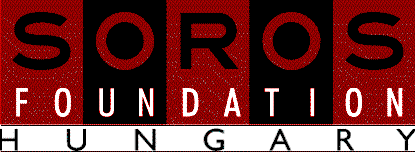 |
MESSAGE FROM THE EXECUTIVE DIRECTOR |
|
Founded in 1984, the Soros Foundation-Hungary is the first East European foundation sanctioned by the philanthropist George Soros and one of the oldest private, independent foundations in formerly communist Eastern Europe. Over the past 14 years, under two radically different social systems, we have used our resources to fund individuals and organizations whose activities contribute to the building of an open society in Hungary.
Hungary has had relatively little experience as an open society, the imposition of Soviet-style communism after World War Two being the last and most dramatic stage of a long history of oppression. However, Hungarian society has changed substantially over the last 14 years, especially since the breakdown of the single-party state in 1989.In response to this rapid transformation - part of a change in social systems arguably unprecedented in speed and scope which engulfed all of Eastern Europe and the former Soviet Union by 1991 - our priorities are frequently updated and our programs renewed. For example, two of our five grantmaking programs, Primary / Secondary Education and Youth as well as Public Health and Social Welfare, which together comprise almost 60% of the foundation?s 1998 program budget, will end next year while the Roma Program will be substantially revised and expanded.
This year alone, some 35,000 individuals will receive money - either directly or via grantee organizations - through our five grantmaking programs. An additional 5,000 people will participate in our non-grant service programs.
The development of the Soros Foundation-Hungary?s programs can be broken down into three stages. Our objective in the first stage, from 1984 to 1990, was to demonstrate the falsehood of communist dogma by fostering alternatives. One of our most noticeable successes during this period was the ?xerox machine program.? Until 1989, photocopying was not permitted in Hungary without a haphazard and bureaucratic authorization process. Recognizing that access to information is one of the keys to an open society, we purchased hundreds of xerox machines and distributed them to all kinds of organizations throughout the country - from universities and research libraries to the simplest bureaus and offices - and in so doing made a small but important step in providing access to information in a closed society.
During the second stage, from 1990 to 1994, we strove to support the transition from a closed to an open society by promoting the civil sector. We financed the establishment and operation of hundreds of NGOs and initiated support for a diverse array of state-sector institutions, such as schools, theaters, and libraries, which suffered dramatic funding cuts as the transition to a market economy began to take its toll.
The third and present stage, in effect since 1994, has been an effort to encourage structural change and development through a variety of new initiatives. As opposed to our work under communism, which was carried out largely under the blind eye of the authorities, we have for the most part enjoyed real cooperation with the government, other NGOs and the newly emerging private sector.
As the twenty-first century of information, globalization and interdependence draws near, Hungary faces huge challenges to keep up with the times. NATO membership is on the immediate horizon and entrance into the EU not far behind. Being a part of modern Europe and the free world means meeting norms already in place as well as reaching out to those neighbors who have also shared a similarly oppressive past. But most of all it means shaking off the cobwebs which have laced our own history and building, step by step, an open and humane society here in Hungary.
Éva Bakonyi
Executive Director